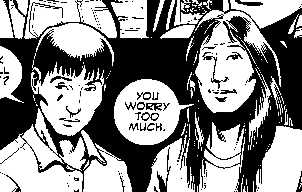 From the LA Times, Westside Weekly edition, 7/11/99:
From the LA Times, Westside Weekly edition, 7/11/99: From the LA Times, Westside Weekly edition, 7/11/99:
From the LA Times, Westside Weekly edition, 7/11/99:
Native Calling
Culver City artist/writer creates a new kind of comic book
starring Native American superheroes
By Katrina Dean, Westside Weekly
When Drew Quyatt, also called Snake Standing, and Billy Honanie, known as Rain Falling, were confronted with a group of bad guys with guns, they didn't respond the traditional superhero way, with super-powered punches or laser eye beams.
They sent rattlesnakes—and ran.
The newest thing to hit the shelves this summer is "Peace Party," a comic book with Native American superheroes that does just what its title implies: promote peace.
The comic's premiere issue will be out at the end of July and will be available at Comics Ink in Culver City. Unlike most other comic books, "Peace Party" sheds traditional comic book violence for multicultural conflicts.
The two heroes for "Peace Party" are Drew a reservation-raised Native American, and Billy a Native American lawyer—two cousins from different upbringings thrown together after a visit from a supernatural being, when they are imparted with supernatural powers.
In an effort to balance the traditions of their pasts with modern society, these two protagonists use nature and the elements to combat evil.
Creator Rob Schmidt of Culver City said he modeled his young heroes after members of the Southwest Pueblo tribe.
"The Pueblo were farmers rather than warriors," said Schmidt, a business programmer analyst by day. "I wanted to create a comic book steeped in a culture of nonviolence."
So far, the paper story collection has earned the respect of a number of Native Americans—some of whom provided feedback for Schmidt, who is not Native American.
"I'm excited because it's sending a positive message to Indian kids," said Arigon Starr, a singer from West Hollywood who is part Kickapoo and Creek and offered [her] ideas to Schmidt. "Some of the kids tend to look at their traditions as outdated, but these traditions can work in the real world."
Even with the supernatural aspect, Starr believes there are still many traditional values portrayed in the characters' thought process[es] and decision making.
Steve Russell, a member of the Cherokee tribe, thinks it will have more influence on kids who have no Native American background.
"It sends a positive message to white kids who might run across Indian kids in their day-to-day lives," said Russell, a social and political science professor at the University of Texas in San Antonio who served on an unofficial board of advisors for the comic.
"Rob has been very careful with his depictions of Native culture," Russell added.
Why use Native American superheroes?
"I wanted to show society that there is more than one set of assumptions," Schmidt said. "Minority people don't look at us the same way as we look at ourselves."
With his two main characters at opposite ends of the spectrum, Schmidt creates a dynamic duo that not only fight the forces of darkness, but manage to share their thoughts on pollution and political injustice.
"I felt that this comic book helped tie together all my interests—political, multicultural, writer and amateur artist," Schmidt said.
"I think he's done a good job portraying what is happening today," said Lorenzo Baca, a Mescalero Apache from Northern California who also served on the volunteer advisory board. "The values of this culture are out of balance."
In an effort to identify themselves as individuals, Billy and Drew must come to terms with their new lives as superheroes and balance what they've been taught by society with what they know from their Indian heritage.
"I think the line that summarizes their different states of mind best is when Billy says, ‘God, what's happened to us?' And Drew says, "Lord, think of the possibilities,'" Schmidt said. "Billy thinks of his powers as an obstacle, and Drew thinks of them as an avenue of exploration.
Russell thinks that Schmidt's portrayal of the inner conflict within the two cousins directly relates to the inner conflict of modern day Native American children.
"Indian kids have knowledge of their history from their relatives, and it doesn't jibe with modern culture," said Russell, who is Cherokee Indian. "You either live with it or become a drunk."
"It's like you belong to an ancient warrior society," Baca said. "And its members are still warriors today; it's just the battles and the enemy are different.'
With high expectations for this month's debut, Schmidt hopes his audience will detect a message in the witty dialogue of "Peace Party."
But others fear the message may go undetected because the realistic subject material requires a more sophisticated mind.
"His is a smart person's comic book," Russell said. "That's what worries me. Because how many smart people are out there reading comic books?"
Rob replies
A few corrections to this fine review:
|
. . . |

|
All material © copyright its original owners, except where noted.
Original text and pictures © copyright 2007 by Robert Schmidt.
Copyrighted material is posted under the Fair Use provision of the Copyright Act,
which allows copying for nonprofit educational uses including criticism and commentary.
Comments sent to the publisher become the property of Blue Corn Comics
and may be used in other postings without permission.